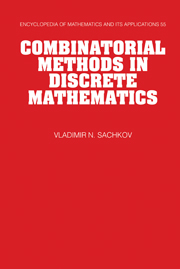3 - Generating functions
Published online by Cambridge University Press: 22 March 2010
Summary
The generating functions considered in this chapter are important instruments for solving the so-called enumerative problems in combinatorial analysis. Enumerative problems arise if we need to be explicit about the number of ways of choosing particular elements from a finite set. The application of generating functions in this situation consists of establishing a correspondence between the elements of the set and the terms of the products of some series; the solution of enumerative problems is reduced, in fact, to finding a suitable method for the multiplication of these series. Under these conditions, the convergence of the series is not necessary, and it is natural to use a formal power series, assuming that the operations on them are properly defined. The formal power series, generally speaking, of several variables, are called the generating functions.
Note that the application of generating functions to the solution of enumerative problems connected with establishing a correspondence between the elements of a set and the terms of formal series is an intermediate problem of combinatorial analysis. To solve the main problem (consisting of the derivation of expressions for the number of elements in a set depending on the parameters determining this set) it is appropriate to consider the corresponding power series as convergent in some domain of variation of a real or complex variable. Inside such domains the power series determine analytic functions whose properties are well known in classical analysis. We do not introduce a new terminology for the analytic functions applied to the solution of enumerative problems, but, rather, we call them the generating functions also.
- Type
- Chapter
- Information
- Combinatorial Methods in Discrete Mathematics , pp. 102 - 164Publisher: Cambridge University PressPrint publication year: 1996



